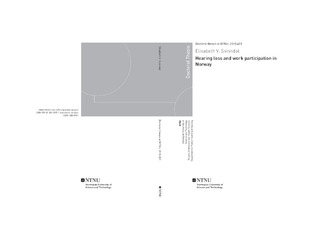Hearing loss and work participation in Norway
Doctoral thesis
Permanent lenke
http://hdl.handle.net/11250/2583496Utgivelsesdato
2018Metadata
Vis full innførselSamlinger
Sammendrag
Hearing loss is a highly prevalent condition with an estimated 1.4 billion people worldwide and among the five leading causes of years lived with disability. In Scandinavia, the prevalence is estimated to 10 to 13 % among persons of working age. Various studies have indicated that individuals with hearing loss constitute a vulnerable group in the labour market implying decreased participation and increased strain compared to the population at large.
The aim of this thesis was to shed light on work participation for people with hearing loss in Norway and the criteria influencing their work participation. As a whole, the aim was to identify barriers and facilitators to their participation.
The thesis constitutes one cross-sectional study and two interview studies. In the cross-sectional study, 3300 individuals with hearing loss responded to a survey on labour market participation and functioning. The first interview study consisted of 21 interviews with individuals with hearing loss, where they described their labour market experiences, while the second interview study was based on interviews with 10 managers and their experiences with employees with hearing loss.
The first study showed that increased degree of hearing loss might constitute increased degree of fatigue. Women in particular seemed to experience negative impact from the hearing loss. The second study showed that both intrinsic and extrinsic factors influenced the degree of strain over the course of working life. The employees knowledge on and acknowledgement of the impact of the hearing loss on their lives were prerequisites for initiation of important adjustments. The ability of the workplace to meet the needs and contribute to solutions played a role for the perceived degree of strain. Access to extensive services and service providers who contributed to increase the knowledge on hearing loss were important contributions to increase the level of acknowledgement, and thus, the prerequisites for self-efficacy concerning hearing loss issues. The third study showed that the managers had a positive inclination towards accommodation, but lacked prerequisites for contributing to adequate, permanent solutions. They considered hearing loss a limited challenge and trusted that the employee knew which adequate measures to take. Consequently, support was not requested.
The thesis identifies barriers and facilitators in labour market participation for individuals with hearing loss. Increased attention on the risk for fatigue in a long-term perspective is needed for employees with hearing loss. Transfer of knowledge from service providers to the employees would constitute an important contribution towards improved prerequisites to form ones working conditions. Systematic assessment of negative impact from hearing loss and fatigue as part of the follow-up of individuals with hearing loss in health care could reveal a negative development and be used to initiate permanent workplace accommodations.
Består av
Paper 1: Svinndal, Elisabeth Vigrestad; Solheim, Jorunn; Rise, Marit By; Jensen, Chris. Hearing loss and work participation: a cross-sectional study in Norway. International Journal of Audiology 2018 ;Volum 57.(9) s. 646-656 https://doi.org/10.1080/14992027.2018.1464216 This is an Open Access article distributed under the terms of the Creative Commons Attribution-NonCommercial-NoDerivatives License (http://creativecommons.org/licenses/by-nc-nd/4.0/), which permits non-commercial re-use, distribution, and reproduction in any medium, provided the original work is properly cited, and is not altered, transformed, or built upon in any way.Paper 2: Svinndal, Elisabeth Vigrestad; Jensen, Chris; Rise, Marit By. Working life trajectories with hearing impairment. Disability and Rehabilitation 2018 s. 1-11 https://doi.org/10.1080/09638288.2018.1495273 This is an Open Access article distributed under the terms of the Creative Commons Attribution-NonCommercial-NoDerivatives License (http://creativecommons.org/licenses/by-nc-nd/4.0/), which permits non-commercial re-use, distribution, and reproduction in any medium, provided the original work is properly cited, and is not altered, transformed, or built upon in any way.
Paper 3: Svinndal, E.V., Jensen, C. & Rise, M.B. Leader responsibility for employees with hearing impairment. A qualitative study exploring employers’ experiences. - Is not included in NTNU Open
